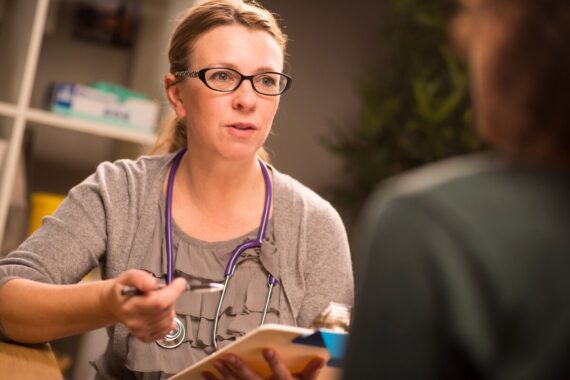NHS workforce goals ‘will fail’ without trainer expansion, GMC warns

Plans for expanding the medical workforce ‘will fail’ if the NHS does not prioritise trainer capacity and support, the GMC has warned.
Last year, NHS England set out an ambitious workforce plan to expand medical school and GP training places, but a Pulse analysis revealed that achieving these goals would require large increases to trainer capacity.
The doctors’ regulator has today published its annual training survey, which had over 74,000 responses and showed that GP trainers remain among those most at risk of burnout.
Over two-thirds of GP trainers said they ‘always or often feel worn out at the end of the day’, compared to half of those working in secondary care.
The proportion of GP trainers at ‘high risk of burnout’ is 15%, which is consistent with last year’s survey results.
This is higher than the average of 12% of trainers across all specialties, and third only to emergency medicine at 26% and ophthalmology at 16%.
Overall, half of doctors with training responsibilities are at ‘high or moderate risk of burnout’, which has been a consistent pattern over the last three years.
According to the GMC, these figures show that there are ‘clear signs of strain’ among the medical trainer workforce, which will ‘only intensify’ as training places increase.
NHS England’s long-term workforce plan committed to doubling the number of medical school places to 15,000 by 2031 and to increasing GP training places by 50% to 6,000 over the same period.
Pulse’s award-winning analysis of the plan highlighted scepticism among already-stretched GP trainers, and concluded that NHS England’s pledges would require a doubling of the current general practice training capacity within five years.
NHSE’s plan acknowledged that successfully expanding the workforce is ‘contingent’ on an ‘expanded and fully trained supervisory workforce’, however it did not make any solid commitments to achieve this.
In its new training report, the GMC said it ‘welcomes’ NHS England’s ambitions but emphasised that it is ‘essential this is mirrored by a significant expansion of multidisciplinary educators’.
The report said: ‘The issues raised in the survey by both trainees and trainers will continue to deteriorate unless plans to expand medical student numbers are delivered alongside corresponding increases in trainer capacity.’
It added: ‘Efforts to solve the problems of the health services through training more doctors in the UK will fail if training capacity and prioritisation are not addressed and if employers do not address their responsibilities to support wellbeing.’
In addition to figures on medical trainers, the GMC survey also found that more than a fifth (21%) of trainees were at high risk of burnout.
Other findings:
- GP trainers were the most positive about the support they receive from their employer or local education team, with 84% of respondents rating it as good or very good, compared to 56% of surgery trainers;
- Female GP trainees experienced some of the lowest levels of ‘unwelcome sexual comments’ that cause ‘embarrassment, distress, or offence’, with 3% of respondents stating negative responses, compared to 16% in surgery and 15% in emergency medicine;
- General practice had the third highest rate of trainees (70%) who strongly agreed that they are given opportunities to develop leadership skills.
Professor Colin Melville, medical director and director of education and standards at the GMC, urged ‘workforce planners’ to ‘look ahead’ and ensure trainers have sufficient protected time and support.
He said: ‘Plans to increase medical school places are much needed and welcomed. However, to ensure these places produce the skilled doctors of tomorrow, we also need to increase the number of educators and provide them with the necessary time and support.’
The BMA said the results show ‘in stark detail’ the ‘challenge’ the Government faces in achieving its goals to expand the workforce.
BMA workforce lead Dr Latifa Patel said: ‘Greater numbers of medical students and postgraduate doctors will require greater capacity to train them, and the system is already creaking at the seams.’
She added: ‘While some of these trends show slight improvement, the overall picture is that postgraduate training is still in a troubling place,’ she added.
A spokesperson for NHS England said the report demonstrates the ‘continued need to support the training’ of doctors and also the ‘importance of recognising the risk of burnout’ for both trainees and trainers.
‘We know there is more to do and so we are strengthening occupational health services and reviewing our mental health and treatment offer for staff to ensure everyone working in the NHS has the right support they need,’ they added.
During the election, the Labour Party committed to delivering the NHS workforce plan, and health secretary Wes Streeting regularly claimed that it was based on Labour’s own policies.
Nearly 10,000 GPs signed a recent RCGP letter to Mr Streeting demanding that he urgently reviews the plan, with a view to increasing the number of fully-qualified GPs.
The letter also highlighted the need to provide sufficient capacity to train more GPs.
Earlier this year, NHS England suggested that GP trainers should be paid more in order to achieve the planned expansion of training places.
In its submission to the doctors’ pay review body, the national commissioner highlighted that the current ‘balance of workload to remuneration’ is the ‘main reason’ GPs and practices are ‘deciding not to join the training community’.
Pulse October survey
Take our July 2025 survey to potentially win £1.000 worth of tokens

Related Articles
READERS' COMMENTS [2]
Please note, only GPs are permitted to add comments to articles










Who needs GPs when we have PAs and dragons?
Still do not understand why I did NOT have to be trained all those years ago